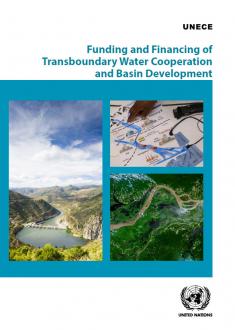More than 60 per cent of the world’s freshwater flow is shared between two or more riparian states. The sustainable and cooperative management of these transboundary water resources is crucial for access to water, sustainable development as well as regional stability and peace. However, many countries and basins struggle to identify and mobilize the needed funding for transboundary water cooperation processes and basin development projects.
Financial capacity constraints faced by countries and limited understanding of the benefits of cooperation often hinder the mobilization of financial resources for transboundary water cooperation and basin development. The risk perceived in investing in transboundary settings is also often considered a challenge, especially by investors.
This publication provides a comprehensive overview of the sources of funding and financing available to support transboundary water cooperation and activities related to the management and development of shared basins. It analyses the key opportunities and challenges related to their financing. It explores the different financial needs for the establishment and operation of joint bodies and for the elaboration and implementation of basin management and development projects. It also maps these needs with existing and potential sources of funding and financing, from both public and private entities.
Developed in the framework of the Water Convention under the leadership of Switzerland and the Netherlands, and in cooperation with many partners including the African Development Bank (AfDB), the Asian Development Bank (ADB), the European Investment Bank (EIB), the Global Environment Facility (GEF), the Inter-American Development Bank (IDB), the Organisation for Economic Co-operation and Development (OECD) and the World Bank, this publication is intended for water management practitioners, basin managers, representatives of national ministries in charge of economic planning and finances, as well as joint bodies, international financial institutions and private sector/ financiers. It aims to engage them in a dialogue on how best to meet the financial needs of transboundary water cooperation and basin development for the benefit of the world’s shared basins and their riparian communities.
ECE/MP.WAT/61
Download the publication in English , French , Russian and Spanish.
Why reading this publication is important?“Cooperation across political boundaries in shared water systems is a necessity to ensure strong resilient ecosystems and enable a sustainable future. This publication is an important contribution to the global discourse, and I trust that it will contribute towards our shared understanding of needs and resources available for transboundary water cooperation and basin development.” - Mr. Gustavo Alberto Fonseca, Director of Programs, Global Environment Facility “As the publication highlights, basin-level agreements and the establishment of joint institutions are critical both for facilitating coordinated and sustainable development of shared freshwater resources and as evidence of country commitment to cooperation, they are key factor in attracting and accessing financial resources, including from funding mechanisms focused on supporting cooperative, regional and basin-scale development.” - Ms. Christina Leb, Senior Counsel at the Environment and International Law Department (LEGEN), World Bank “From an IFI perspective, the publication sheds light in key aspects needed to de-risk transboundary investments for water and associated sectors (Nexus investments) by showcasing how improving institutional conditions for transboundary cooperation catalyses opportunities for safer and more attractive investment, not only for public funding or MDBs, but also for private sector and capital markets. The Water Convention with no doubt offers an alternative framework to support riparian countries not also to improve their cooperation towards more sustainable and resilient water management, but also by offering a more solid base upon which jointly identify investments and attract funding sources. The publication was also very informative about specific examples regarding the link between better cooperation and finance in transboundary basins.” -Mr. Raul Muñoz Castillo, Senior Water Specialist at the Inter-American Development Bank (IDB) |
More information on the work on financing transboundary water cooperation and basin development can be found here: https://unece.org/environment-policy/water/areas-work-convention/financing-transboundary-water-cooperation


